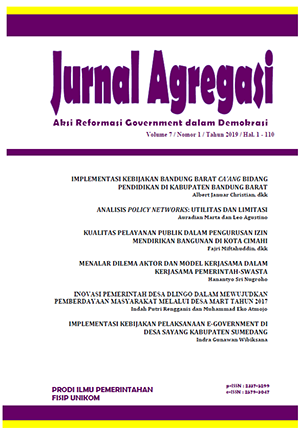THE IMPLEMENTATION OF E-GOVERNMENT IMPLEMENTATION POLICY IN SAYANG VILLAGE, SUMEDANG DISTRICT
DOI:
https://doi.org/10.34010/agregasi.v7i1.1697Keywords:
Implementation, Policy Implementation, E-GovernmentAbstract
Implementation of e-Government in the village dear by referring to presidential instruction number 3 Implementation of e-Government Policy in Quality Improvement is still at the stage of preparing access facilities such as a limited wifi connection, as well as a lack of socialization of information sites to the public. The research method used by researchers is a qualitative research method with a desktiptif approach. Data collection techniques are carried out by means of literature studies and field studies. As for the indicators of basic values in determining the success and failure of applications that will and must be achieved in implementing e-Government there are 4 namely effectiveness, efficiency, transparency and accountability. The application of e-Government policies in Sayang Village is still not optimal in the use of communication and information technology. The Village Government unfortunately has not been effective, efficient, transparent and accountable in implementing E-Government-based governance.
Downloads
References
Indrajit, Richardus Eko.(2004). E-Government Strategi Pembangunan Dan Pengembangan Sistem Pelayanan Publik Berbasis Teknologi Digital. Yogyakarta:Andi Offset.
Amrih Rahayuningtyas, D. P., & Setyaningrum, D. (2018). Pengaruh Kelola dan EGovernment terhadap Korupsi. EKUITAS (Jurnal Ekonomi Dan Keuangan), 1(4), 431
Bungkaes, H. R. (2013). Hubungan Efektivitas Pengelolaan Program Raskin Dengan Peningkatan Kesejahteraan Masyarakat Di Desa Mamahan Kecamatan Gemeh Kabupaten Kepualauan Talaud. Journal "ACTA DIURNA" Edisi April 2013, (April), 1–23.
Data, B., & Dan, P. (2006). Basis Data Peraturan dan Perundang-undangan. Program, 1–14.
Edwi, A. S. (2008). Evaluasi Implementasi E-Government Pada Situs Web Pemerintah Daerah Di Indonesia: Prespektif Content dan Manajemen. Seminar Nasional Informatika 2008 (SemnasIF 2008), 2008 (November 2007), 88-98.
Forman, M. (2005). Using IT to Transform the Effectiveness and Efficiency of Government. Journal e-Government and Information Technology, Pg. 27.
Gupta, M.P. (2004). Toward EGovernment: Management Chalenges, New Delhi, McGraw Hill Publishing Company.
Nurcahyati Dewi & Retnowati Daru. 2008. Peranan e-government dalam Rangka Mewujudkan Good Governance Bagi Masyarakat. Seminar Nasional Informatika. Yogyakarta
Kase, J. (2010). Perencanaan Strategis Sistem Informasi (SI) Pada Pemerintah Kabupaten Timor Tengah Selatan. Tesis, Universitas Gadjah Mada.
Kurnia, T. S., Rauta, U., & Siswanto, A. (2017). E-Government Dalam Penyelenggaraan Pemerintahan Daerah di Indonesia. Masalah-Masalah Hukum, 46(2), 170–181
Priyanti, Evi.(2017). Pelayanan Publik Berbasis E-Government di Kabupaten Sumedang (Studi Kasus Pada Unit Pelayanan Pengadaan Secara Elektronik di Dinas Perhubungan Komunikasi dan Informatika.
Pratama, Arief Budi. 2005. Penyelenggaraan E-Government Dalam Penyelenggaraan Pemerintahan di Era Globalisasi. Dialogue Undip
Saingura, Hayati & Purnomo, Eko Priyo. (2018). Implementasi E-Government Pada Pemerintah Daerah Bantul Yogyakarta. Research Gate.
Sari, Kusuma D A & Wahyu Agus Winarno. 2012. Implemetasi E-Governement System Dalam Upaya Peningkatan Clean and Good Governance di Indonesia. JEAM Vol XI No. 1
Susartono. 2006. E-Government di Indonesia. Jurnal Ilmu Administrasi Publik UNS, Volume 2 No.1 April 2006.
Sosiawan, Edwi Arief. 2004. Tantangan dan Hambatan Implementasi E-government di Indonesia. http://edwi.dosen.upnyk.ac.id/Tantangan%20egov.pdf [4 Juli 2019]. Www.hukumonline.com. (2004), 1–2.
Instruksi Presiden Republik Indonesia Nomor 6 Tahun 2001 Tentang Pengembangan Dan Pendayagunaan Telematika Di Indonesia World Bank. (2002). New Economy Sector Study, Electronic Government and Governance: Lesson for Argentina.
Instruksi Presiden Republik Indonesia Nomor 3 Tahun 2003 Tentang Kebijakan Dan Strategi Nasional Pengembangan E-Government.
Undang-Undang Nomor 25 Tahun 2009 tentang pelayanan publik.
UU ITE RI. (2008). Uu-2008-11 Informasi Dan Transaksi Elektronik. Undang-Undang, 11, 1–18. Retrieved from papers3://publication/uuid/8C845E4E-CD67-4476-BB4F7123C56F0449
UU KIP RI. (2008). uu 14 th 2008, 282.
Downloads
Published
Issue
Section
License
This work is licensed under :

Creative Commons Attribution-NonCommercial 4.0 International License









